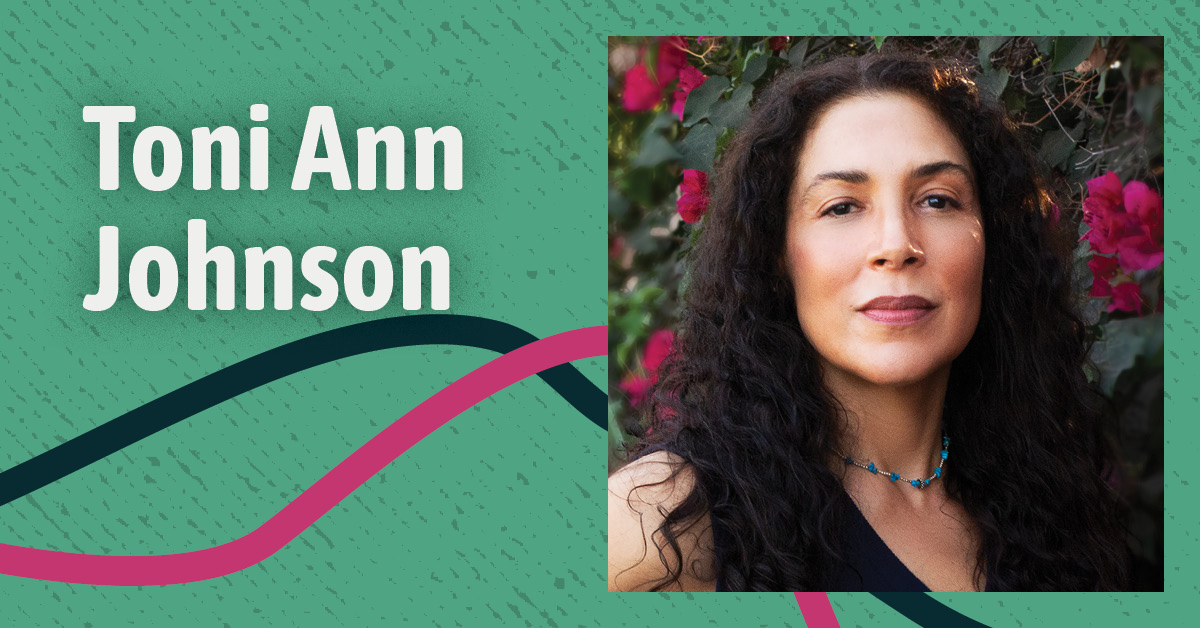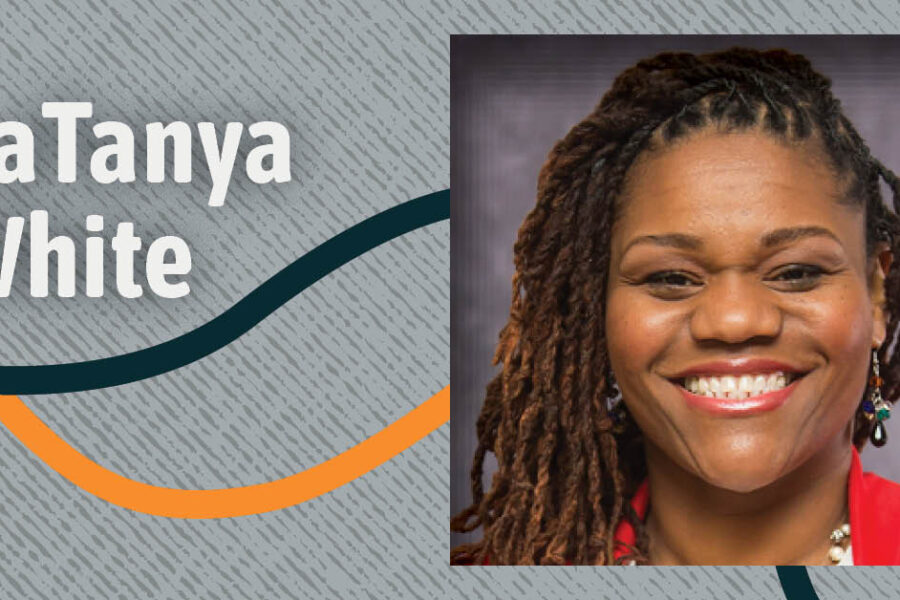Toni Ann Johnson had been writing in marathon mode for weeks. Working from 9am to 7pm, her only breaks were for the most basic necessities. The long hours found her tucked into her California bed—giving her back a break from an uncomfortable desk chair. This wasn’t her usual writing schedule, or position, but she didn’t mind. She was working as fast as she could to complete revisions on her forthcoming short story collection, Light Skin Gone to Waste. And she wanted to finish this latest draft for her new, and quite prominent, editor: the author and outspoken feminist Roxane Gay.
That’s the situation I found Johnson in when I spoke with her a few weeks ago. I was glad to get to spend an hour talking to Johnson, a 2008 alum of the Master of Fine Arts in Creative Writing at Antioch Los Angeles who recently won the 2021 Flannery O’Connor Award for Short Fiction—for the book that she’s now editing. This prestigious prize garners both the publication of the work and a $1000 purse.
Johnson partially credits the great honor of having her book chosen for the Flannery O’Connor Award to the fact that Gay was involved. She says, “I was fortunate to win the Flannery O’Connor award because Roxane Gay was the judge—and because Roxane Gay is a woman of color—and because Roxane Gay is interested in some of those things that I was writing about.” In her own remarks explaining the selection of Light Skin Gone to Waste for the prize, Gay described the book as “an endlessly interesting American family portrait.”
Finding Herself on the Stage
Johnson’s powerful fiction, in which she writes about social dynamics and constructions around race, is often inspired from her own experiences growing up. Johnson writes about her childhood as a member of one of the only Black families living in the mostly white, mostly conservative town of Monroe, New York. This clearly impacted her understanding of race in the world, but so too did her parents’ refusal to live within the confines of what the world thought the Black experience should look like. Her father was an iconoclast. He held a PhD in Psychology, a postdoctoral diploma in psychoanalysis, and, says Johnson, “He was crazy and eccentric, and he just didn’t care what other people said.” Her mother, on the other hand, was a fighter. “She would do things just to see if somebody would tell her she couldn’t do it.”
Johnson appreciates all the opportunities her parents presented her with, but it was hard being the only Black kid in class year after year. “I did not have a Black perspective,” Johnson explains. “I had to learn what my own Black experience was going to be. I had to make that for myself”
And one place that shaped her experience was theater. She was 14 when she started out in theater in New York City, commuting from Monroe to study at The Lee Strasberg Theater Institute. At 17, she enrolled in NYU’s Tisch School of the Arts where she earned a BFA in Drama. Later, she found a community in New York City that opened doors to a Black cultural experience she hadn’t experienced previously. “My friends were other actors of color and playwrights and filmmakers,” she says, “and I learned more about who I was—how I was different and how I was similar to those people—from them than from my parents.” In the midst of this support, she could find roles on stage, but she was passed over for the commercials, television shows, and movies she hoped for. She says, “In the early 80s, often, I wasn’t welcome to audition for Black roles, because those roles required being identifiably Black, and I looked more ethnically ambiguous.”
She got some spots in regional commercials,and was on two soap operas—“All My Children” and “Loving”—as well as landing a role in Spike Lee’s School Daze. But she wanted more. “When I was acting, I kept being told I didn’t look Black enough, or I didn’t seem Black enough to play certain parts,” Johnson says. This pushed her to develop her own characters—and to write her own plays to cast these characters in.
One of the first plays she wrote was Gramercy Park is Closed to the Public. In it she included a young character who was biracial. “It’s a story that I relate to and understand,” Johnson explains. “I don’t have one white parent, but I grew up in a white environment.”
She had been denied so many roles for not fitting into a perceived narrative of Blackness. Finally, through creating this new character she hadn’t before seen in the world, she was able to step into the limelight. As Johnson says, “I wrote this part for myself.”

Telling Her Own Story
Johnson’s writing has been produced on the stage, filmed for the screen, and published in books over the years—but it hasn’t been an easy journey. Especially when it came to publishing Light Skin Gone to Waste. “This is a sad story with a happy ending,” Johnson says.
After the success of her play Gramercy Park is Closed to the Public, Johnson moved to Los Angeles to pursue acting, and she brought her play along with her. Although it wasn’t her main purpose in moving, the play is what caught Hollywood’s attention and by 1994 she had signed with literary agent Dave Wirtschafter. He helped launch her screenwriting career. That led to her working on films such as Ruby Bridges and Crown Heights, both of which won her the prestigious Humanitas Prize.
Eventually, though, she got tired of working on other people’s projects. “People kept telling me how to write,” Johnson says. “After a while, I was so frustrated and, honestly, angry, that I just didn’t want to do it anymore.”
So in 2006 Johnson decided it was time to tell her own stories. She chose to pursue a Master of Fine Arts in Creative Writing, and she ended up enrolling in the Antioch MFA, a program founded by Los Angeles poet Eloise Klein Healy. Johnson chose this program because it offered the opportunity to balance her work and life. And it didn’t hurt that it was a convenient six miles away.
Johnson was able to pursue her studies while continuing to write screenplays. By the time she graduated from the program she had begun putting together a manuscript of fictional short stories that echoed many of her own experiences. Considering the unique perspective of her upbringing Johnson says, “We did things that the larger culture did not see Black people doing, especially if they didn’t know any Black people.”
Writing Against Stereotypes of Blackness
The stories Johnson began in her thesis ran counter to the monolithic Black experiences she was being pressured to relate in her screenplays. In those story meetings, which were continuously dominated by white producers and executives, Johnson had, for over a decade, found herself being asked to repeatedly rewrite characters to match these white people’s imagined representations of Black people.
Often, the experience was demoralizing. Johnson says she would be sent on fascinating research trips, only to find what she learned being tossed out. “They weren’t as interested in the actual truth,” she explains. “And these were primarily stories based on real people and real experiences, but the truth didn’t correspond with what they knew from other movies.”
After nearly a decade of working in these spaces, she no longer wanted “to have somebody tell me that Black people didn’t talk like that, or Black people didn’t write like that, or whatever Black people didn’t do.”
So she poured herself into writing these stories. She became more and more fascinated by trying to represent the complexities faced by real people. She wanted something different, she says. She wanted “to reconnect with my own voice, which I had been cultivating as a young playwright.”
The Ups and Downs of a Writer’s Life
The final manuscript she graduated from Antioch with was not polished enough for publication—but it did become the bones of her forthcoming collection, Light Skin Gone to Waste. They even share the same title. But her new book is also very different from the almost fifteen-year-old manuscript. The shape, form, and stories have changed dramatically since her graduation. She says that in 2007, “I was starting the ideas, thinking about them back then. But it was nowhere near ready at the time.”
In 2017, after writing another novel, Johnson returned to the stories and brought them to an agent. “The agent felt like it wasn’t gonna be an easy sell as a story collection, and advised me to rethink it as a novel,” says Johnson. So she spent the next few years delving back into the manuscript. She worked on “sort of adjusting the story,” she says, which she accomplished by combining the discrete narratives so it began to flow together. “But then,” she explains, “[my agent] had me bring in all these other perspectives.”
It didn’t sell.
“I was so devastated,” Johnson says. After doing all that work, for all those years, the rejection was crushing. “I placed my whole heart,” she explains, “and all my hopes into this thing.”
She tried to reassure herself that rejection is a part of getting published, though. Logically, she knew that editors see so many stories that there has to be a serendipitous moment to have a piece chosen. Not only does it have to be the right editor at the right time, the work also has to resonate with the mission of the press. It didn’t lessen the sting.
“I have had hundreds and hundreds of rejections,” explains Johnson. “So, a rejection of a short story doesn’t wound me. But the rejection of a book I worked on for years like that? I couldn’t move for days.” After bringing in new characters and weaving together narratives, the feedback she got was that the book was too “unwieldy.” And although she didn’t disagree, she says, “I was trying to sell a bigger book.”
It was a low point for Johnson. She was teaching at the time and felt the absence of a significant achievement to point to in her life. “My mom kept saying, ‘One of your students might become a star.’ Like she had moved on from my possibility of doing anything more,” says Johnson. As for herself, she wasn’t ready to give up on her work quite yet. “I think I had to allow myself that grief,” Johnson says. But she continued to write and submit, and slowly she worked her way back from despair.
A Victory That Came After a Struggle
Johnson found support in her writing community. During the pandemic, she met weekdays from 11am to 3pm with a group of other writers on Zoom. In this way she tried to treat her writing like she would any other job. Johnson describes herself as being in the depths of this misery when her story “Homecoming” won Accents Publishing’s inaugural novella contest in 2020. But this wasn’t enough to pull her out of the frustrations of not being able to sell her novel.
That happened when “Homegoing” was published in May 2021.
The novella, which had originally been the culminating story in Light Skin Gone to Waste, needed publicity. Although there wasn’t much she could do in the pandemic, the positive response she received during online events for the book sparked her confidence, and she began to consider submitting parts of the work that hadn’t sold. Chatting with people in her writing group encouraged her to look at other contests. “I wanted to find places for all those other stories,” she says. So she pulled her novel back apart. And fatefully sent a group of her stories in for the Flannery O’Connor award.
She won the award, and her literary career now feels like it is on a true upward trajectory. But in telling me her story, she didn’t want the focus to be all on the positives. Johnson hopes sharing the challenges she faced getting published, the emotional journey she went through, and her ultimate success, will help other writers navigate their paths. And she continues to look forward to her own future.
“I don’t think those are the only stories that I want to tell,” says Johnson. She has a novel she is working on—one that has also seen many lives as both a play and screenplay. Her next big dream is that it will be optioned for film. Johnson describes the ups and downs of writing life as cyclical. “I don’t get comfortable,” she says. “No, you constantly have to work hard and keep trying to do the next thing.”
(Cover photo credit Rachael Warecki.)





